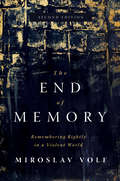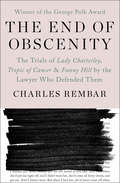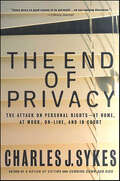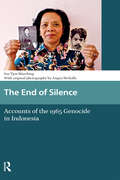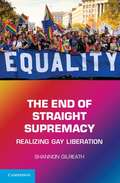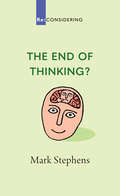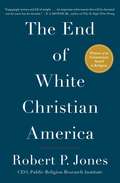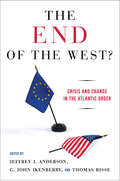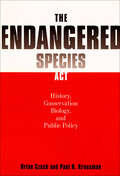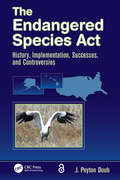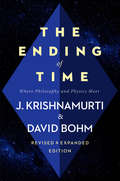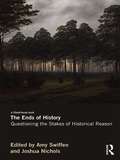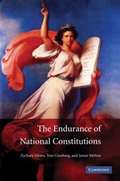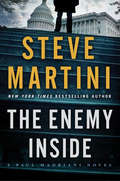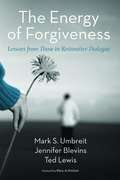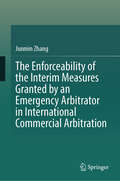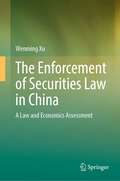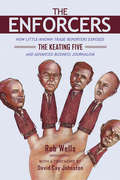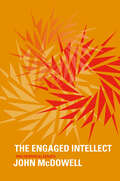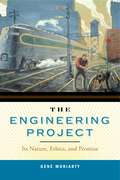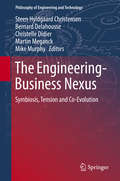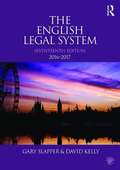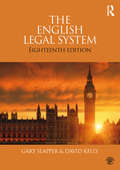- Table View
- List View
The End of Memory: Remembering Rightly in a Violent World
by Miroslav VolfWinner of the Christianity Today Book Award in Christianity and Culture How should we remember atrocities? Should we ever forgive abusers? Can we not hope for final reconciliation, even if it means redeemed victims and perpetrators spending eternity together? We live in an age that insists that past wrongs—genocides, terrorist attacks, bald personal injustices—should never be forgotten. But Miroslav Volf here proposes the radical idea that letting go of such memories—after a certain point and under certain conditions—may actually be a gift of grace we should embrace. Volf&’s personal stories of persecution and interrogation frame his search for theological resources to make memories a wellspring of healing rather than a source of deepening pain and animosity. Controversial, thoughtful, and incisively reasoned, The End of Memory begins a conversation that we avoid to our great detriment. This second edition includes an appendix on the memories of perpetrators as well as victims, a response to critics, and a James K. A. Smith interview with Volf about the nature and function of memory in the Christian life.
The End of Obscenity: The Trials of Lady Chatterley, Tropic of Cancer & Fanny Hill by the Lawyer Who Defended Them
by Charles RembarWinner of the George Polk Award: Charles Rembar's illuminating account of overturning America's obscenity laws and protecting literature from censorship Up until the 1960s, depending on your state of residence, your copy of Henry Miller's Tropic of Cancer might be seized by the US Postal Service before reaching your mailbox. Selling copies of Cleland's Fanny Hill in your bookstore was considered illegal. Lady Chatterley's Lover by D. H. Lawrence was, according to the American legal system, pornography with no redeeming social value. Today, these novels are celebrated for their literary and historic worth. The End of Obscenity is Charles Rembar's account of successfully arguing the merits of such great works of literature in front of the Supreme Court. As the lead attorney on the case, he--with the support of a few brave publishers--changed the way Americans read and honor books, especially the controversial ones. Filled with insight from lawyers, justices, and the authors themselves, The End of Obscenity is a lively tour de force. Racy testimony and hilarious asides make Rembar's memoir not only a page-turner but also an enlightening look at the American legal system.
The End of Ownership: Personal Property in the Digital Economy (The Information Society Series)
by Aaron Perzanowski Jason SchultzAn argument for retaining the notion of personal property in the products we “buy” in the digital marketplace. If you buy a book at the bookstore, you own it. You can take it home, scribble in the margins, put in on the shelf, lend it to a friend, sell it at a garage sale. But is the same thing true for the ebooks or other digital goods you buy? Retailers and copyright holders argue that you don't own those purchases, you merely license them. That means your ebook vendor can delete the book from your device without warning or explanation—as Amazon deleted Orwell's 1984 from the Kindles of surprised readers several years ago. These readers thought they owned their copies of 1984. Until, it turned out, they didn't. In The End of Ownership, Aaron Perzanowski and Jason Schultz explore how notions of ownership have shifted in the digital marketplace, and make an argument for the benefits of personal property.Of course, ebooks, cloud storage, streaming, and other digital goods offer users convenience and flexibility. But, Perzanowski and Schultz warn, consumers should be aware of the tradeoffs involving user constraints, permanence, and privacy. The rights of private property are clear, but few people manage to read their end user agreements. Perzanowski and Schultz argue that introducing aspects of private property and ownership into the digital marketplace would offer both legal and economic benefits. But, most important, it would affirm our sense of self-direction and autonomy. If we own our purchases, we are free to make whatever lawful use of them we please. Technology need not constrain our freedom; it can also empower us.
The End of Privacy: The Attack on Personal Rights—at Home, at Work, On-Line, and in Court
by Charles J. SykesAs Justice Louis Brandeis suggested more than a century ago, privacy--the right to be left alone--is the most valued, if not the most celebrated, right enjoyed by Americans. But in the face of computer, video, and audio technology, aggressive and sophisticated marketing databases, state and federal "wars" against crime and terrorism, new laws governing personal behavior, and an increasingly intrusive media, all of us find our personal space and freedom under attack.In The End of Privacy, Charles Sykes traces the roots of privacy in our nation's founding and Constitution, and reveals its inexorable erosion in our time. From our homes and offices to the presidency, Sykes defines what we have lost, citing example after example of citizens who have had their conversations monitored, movements surveilled, medical and financial records accessed, sexual preferences revealed, homes invaded, possessions confiscated, and even lives threatened--all in the name of some alleged higher social or governmental good. Sykes concludes by suggesting steps by which we might begin to recover the territory we've lost: our fundamental right to our own lives.
The End of Sex and the Future of Human Reproduction
by Henry T. GreelyWithin 40 years many people will stop having sex for reproduction. After IVF and preimplantation genetic diagnosis, parents will pick embryos for implantation, gestation, and birth. It will be easy, safe, lawful, and free, Henry Greely predicts. He explains the new technologies and sets out the deep ethical and legal challenges facing humanity.
The End of Silence: Accounts of the 1965 Genocide in Indonesia (Asian History)
by Soe Tjen MarchingIn the late 1960s, between one and two million people were killed by Indonesian president Suharto's army in the name of suppressing communism-and more than fifty years later, the issue of stigmatisation is still relevant for many victims of the violence and their families. The End of Silence presents the stories of these individuals, revealing how many survivors from the period have been so strongly affected by the strategy used by Suharto and his Western allies that these survivors, still afraid to speak out, essentially serve to maintain the very ideology that led to their persecution.
The End of Straight Supremacy: Realizing Gay Liberation
by Shannon GilreathRooted in the politics and theories of early gay liberation and radical feminism, Shannon Gilreath's The End of Straight Supremacy presents a cohesive theory of gay life under straight domination. Beginning with a critique of formal equality law, centering on the 'like-straight' demands of liberal equality theory as highlighted in Lawrence v. Texas, Gilreath moves to criticize the gay movement itself, challenging the assimilation politics behind the movement's blithe acceptance of discrimination in the guise of free speech and pornography in the name of sexual liberation, as well as same-sex marriage and transsexuality as tools of straight hegemony. Ultimately, Gilreath rejects both the liberal demand for gay erasure in exchange for meager legal progress and the gay establishment agenda. In The End of Straight Supremacy, Gilreath calls gays and their allies to the difficult task of rethinking what liberation and equality really mean.
The End of Thinking? (Re: CONSIDERING)
by Mark StephensRe:CONSIDERING invites you to look at what’s familiar from an unfamiliar angle. To consider how we consider things – and how to do it better.What were you thinking?We all feel entitled to our opinion. Whether it be our take on politics, vaccines, parenting, or the value of religion, everybody wants to have their say – and everybody loves to be right.But do we know what it means to think well?Covering ‘idiot brain’, lobotomies, the difference between certainty and confidence, the nature of facts, and the virtue of intellectual hospitality, Mark Stephens invites you to consider not just what you think but how and why you think.Do we think only for ourselves, or also for the good of others?
The End of White Christian America
by Robert P. Jones&“Quite possibly the most illuminating text for this election year&” (The New York Times Book Review). *Winner of the Grawemeyer Award in Religion* Robert P. Jones, CEO of the Public Religion Research Institute, spells out the profound political and cultural consequences of a new reality—that America is no longer a majority white Christian nation. For most of our nation’s history, White Christian America (WCA) set the tone for our national policy and shaped American ideals. But especially since the 1990s, WCA has steadily lost influence, following declines within both its mainline and evangelical branches. Today, America is no longer demographically or culturally a majority white, Christian nation. Drawing on more than four decades of polling data, The End of White Christian America explains and analyzes the waning vitality of WCA. Robert P. Jones argues that the visceral nature of today’s most heated issues—the vociferous arguments around same-sex marriage and religious and sexual liberty, the rise of the Tea Party following the election of our first black president, and stark disagreements between black and white Americans over the fairness of the criminal justice system—can only be understood against the backdrop of white Christians’ anxieties as America’s racial and religious topography shifts around them. Beyond 2016, the descendants of WCA will lack the political power they once had to set the terms of the nation’s debate over values and morals and to determine election outcomes. Looking ahead, Jones forecasts the ways that they might adjust to find their place in the new America—and the consequences for us all if they don’t. “Jones’s analysis is an insightful combination of history, sociology, religious studies, and political science….This book will be of interest to a wide range of readers across the political spectrum” (Library Journal).
The End of the West?: Crisis and Change in the Atlantic Order
by G. John Ikenberry Thomas Risse Jeffrey J. AndersonThe past several years have seen strong disagreements between the U.S. government and many of its European allies. News accounts of these challenges focus on isolated incidents and points of contention. The End of the West? addresses some basic questions: Are we witnessing a deepening transatlantic rift, with wide-ranging consequences for the future of world order? Or are today's foreign-policy disagreements the equivalent of dinner-table squabbles? What harm, if any, have events since 9/11 done to the enduring relationships between the U.S. government and its European counterparts?The contributors to this volume, whose backgrounds range from political science and history to economics, law, and sociology, examine the "deep structure" of an order that was first imposed by the Allies in 1945 and has been a central feature of world politics ever since. Creatively and insightfully blending theory and evidence, the chapters in The End of the West? examine core structural features of the transatlantic order to determine whether current disagreements are minor and transient or catastrophic and permanent.
The Endangered Species Act: History, Conservation Biology and Public Policy
by Brian Czech Paul R KrausmanThe new model of policy design theory frames the discussion regarding the frequently analyzed Endangered Species Act in this historical perspective.Since the 1970s, the Endangered Species Act (ESA), by virtue of its regulatory impact, has been a frequent subject of policy analysis. In this comprehensive history and critique of the ESA, Brian Czech and Paul R. Krausman incorporate the new model of policy design theory to frame a larger discussion about conservation biology and American democracy. Czech and Krausman provide a historical background of endangered species policy that integrates natural history, socioeconomic trends, political movements, and professional developments. Outlining the controversies surrounding the ESA, they find a connection between challenges to species conservation and challenges to democracy. After an assessment of ESA analyses that have been performed from traditional perspectives, they engage policy design theory to review the structural logic of the ESA, analyzing each clause of the legislation for its application of the fundamental elements of democracy. To address the technical legitimacy of ESA, they propose two new genetic considerations-functional genome size and molecular clock speed-to supplement phylogenetic distinctiveness as criteria with which to prioritize species for conservation. Next, they systematically describe the socioeconomic context of ESA by assessing and classifying the causes of species endangerment. A hybrid of policy analysis and ecological assessment, The Endangered Species Act: History, Conservation Biology, and Public Policy will appeal to scholars and students in the fields of natural resource policy and law, conservation biology, political science, wildlife ecology, and environmental history, and to professionals at agencies involved in wildlife conservation.“Interesting for anyone concerned about the preservation of species and, more generally, the global environment . . . a good explanation of the statute, a wonderful and often entertaining description of how we view and rank nonhuman species, and a provocative critique of the very policy analytic framework the authors have employed.” —Joseph F. C. DiMento Environment“Czech and Krausman are effective and original scholars. The Endangered Species Act: History, Conservation Biology, and Public Policy is both a treatise on policy assessment and an excellent history, assessment, and discussion of the ESA itself. Those interested in natural resources policy and those interested specifically in the ESA will want to read this book.” —Jack Ward Thomas, The University of Montana, Chief Emeritus, U.S. Forest Service
The Endangered Species Act: History, Implementation, Successes, and Controversies
by J. Peyton DoubThe complex regulations of the Endangered Species Act can be challenging for environmental professionals who must comply with them or assist clients in compliance. This volume discusses the Act using clear scientific prose that all professionals can readily comprehend. It explores the history and the basic scientific theory underlying the Act. It provides an overview of its key provisions and examines the Act in the context of other key environmental planning statutes. The book also details the regulatory processes faced by other government agencies and private developers who must routinely ensure that their actions are in compliance.
The Ending of Time
by Jiddu KrishnamurtiSpirituality meets science as two of the greatest minds of our time come together to discuss essential issues of good and evil, thought and consciousness, and the nature of existence.The Ending of Time presents the fascinating conversations between two men from vastly different worlds: revered philosopher Jiddu Krishnamurti and renowned physicist David Bohm. Through deep exploration of the brain vs. the mind, the significance of death, and an individual's relationship to society, they debate the root of human conflict and what we can do about it. Revolutionary insights throughout these discussions reveal the potential for the ending of time to bring about a new beginning for humanity. wrong turn humanity has taken--a state that they argue can be corrected. Though they insist that mankind can change fundamentally, they warn that transformation requires going from one's narrow and particular interests toward the general, and ultimately moving still deeper into that purity of compassion, love and intelligence that originates beyond thought, time, and even emptiness.This updated edition, edited and revised in clear and engaging language, includes a new introduction and a conversation previously published separately which examines "The Future of Humanity."
The Ends of History: Questioning the Stakes of Historical Reason (Laurier Studies In Political Philosophy Ser. #1)
by Amy Swiffen Joshua NicholsThe Ends of History? considers how, despite the fact that events in the past 20 years have called Francis Fukuyama’s infamous announcement of the end of history into question, the issue of the end of history is now a matter of renewed interest and debate. Two decades ago we were confronted by the end of the Soviet Union and collapse of the geo-political divisions that had defined much of the twentieth century. From this particular end, the ‘end of history’ was proclaimed. But is it still possible to argue that liberal democracy and free market capitalism are the final form of law and mode of production in human history? Recent events have called this thesis into question: from 9/11 and the War on Terror, to the current global economic collapse and looming ecological crises, it seems that history if far from over. And yet, oddly enough, the question of ‘the end’ has returned. For example, in the often predicted, but still uncertain, establishment of either a new international American Empire or a new era of International Law, and the global resurgence of religion as a dominant source of political identification. On the other hand, perhaps the ‘end’ is still yet to come, slowly accumulating, mustering at the periphery of the geo-political landscape and outside the productive sphere. Responses taking up these questions range from a return to Universalism, political theology, Messianism, and even the old specter of communism. This volume assesses these responses, exploring what is at stake in proclaiming ‘the end’ in the current historical moment. Is it a matter of reading the writing on the wall? Or is the proclamation itself a political act? Furthermore is there a desire for the ‘end’? In addressing these questions, the contributors to The Ends of History? confront the various ‘ends’ that we now live, and in so doing they open new lines of sight into the future.
The Endurance of National Constitutions
by Zachary Elkins Tom Ginsburg James MeltonConstitutions are supposed to provide an enduring structure for politics. Yet only half live more than nineteen years. Why is it that some constitutions endure while others do not? In The Endurance of National Constitutions, Zachary Elkins, Tom Ginsburg, and James Melton examine the causes of constitutional endurance from an institutional perspective. Supported by an original set of cross-national historical data, theirs is the first comprehensive study of constitutional mortality. They show that whereas constitutions are imperiled by social and political crises, certain aspects of a constitution's design can lower the risk of death substantially. Thus, to the extent that endurance is desirable - a question that the authors also subject to scrutiny - the decisions of founders take on added importance.
The Enemy Inside
by Steve Martini<P>In this riveting new novel in the New York Times bestselling series, defense attorney Paul Madriani uncovers a morass of double-dealing and murder that leads him to the very highest levels of American political power. <P>When a friend, Alex Ives, is implicated in a deadly motor collision on a deserted Southern California highway, Paul Madriani joins a case as tangled as any he's ever taken. Alex swears he had only one drink the night of the crash, but he also can't remember the events of the evening beyond the fact that he was to meet a sexy, mysterious woman at an elegant house party. The next morning he woke up in the hospital in police custody, charged with drunk driving and manslaughter. <P>When Paul discovers that Alex knew the deceased, a connected, hard-charging Washington, D.C., lawyer named Olinda Serna, Madriani realizes the potential penalties for his client could include a death sentence. <P>Across the country in Washington, D.C., attorney Cletus Proffit learns that his law firm nemesis, Ms. Serna, has died in California. Proffit knows that Serna protected dangerous secrets involving players moving in the highest reaches of national politics, and he will go to any lengths to ensure that that knowledge has died with her. <P>Senator Maya Grimes also hears of the fatal crash, and begins crafting her own web of deceit to suffocate anything that might come back to bite her. In the meantime, a vicious, highly effective mercenary--a woman whose calling card is the ability to kill her victims in horrifying, utterly untraceable accidents--begins to panic when she gets word of Serna's death in Southern California and the manner in which it occurred. <P>Now the only way to save a young man from imprisonment is for Madriani, his partner, Harry Hinds, and investigator Herman Diggs to uncover the corruption and dark deeds that surround Ms. Serna's friends and find her killer--before he or she can strike again. <P><b>A New York Times Bestseller</b>
The Energy of Forgiveness: Lessons From Those In Restorative Dialogue
by Mark UmbreitForgiveness is a life-changing experience for many people who have been hurt by others. But forgiveness is paradoxical in that if one relies on forgiveness language or if others prescribe it as an expectation, the depth of that experience can be significantly compromised. Many people experience deep forgiveness without ever using the language of forgiveness.New research on the benefits of forgiveness is on the rise these days, yet there is often little narrative to show the power of forgiveness.
The Enforceability of the Interim Measures Granted by an Emergency Arbitrator in International Commercial Arbitration
by Junmin ZhangThis timely book offers a comprehensive study of the emergency arbitrator mechanism that provides interim measures in international commercial arbitration before the constitution of an arbitral tribunal, focusing on the enforceability of the interim measures granted. Based on the traditional legal doctrines of private international law, international dispute resolution, and arbitration law, this book is featured mainly in comparative studies. Six leading arbitral institutions are chosen to conduct systematic research on applying the emergency arbitration rules to establish a general and common procedural framework for emergency arbitration in discussion. Normative and comparative law analyses investigate the status quo of available legal instruments used to recognize and enforce interim measures in emergency arbitration by examining international conventions and three representative chosen jurisdictions, i.e., Singapore, Mainland China, and the USA. Following these two levels of comparison, it highlights and examines the potential doctrinal and practical barriers that may impact the enforceability of interim measures rendered by an emergency arborator. Finally, it proposes various approaches that could be used to improve the enforceability controversy, and it offers innovative suggestions for further research. This book is of particular relevance and interest to students, researchers, and practitioners in dispute resolution and arbitration law, as well as policymakers, legislators, and arbitral institutions considering further reform in international arbitration.
The Enforcement of Securities Law in China: A Law and Economics Assessment
by Wenming XuThis book takes a law and economic approach to examine the securities law enforcement in China and provides an in-depth empirical analysis on the enforcement inputs and outputs. In contrast to previous studies, it systematically collects a large sample of judicated securities fraud cases and public sanctions as disclosed by the listed companies. The enforcement regime is further divided into the private enforcement exemplified by the civil litigation imitated by harmed investors and public enforcement by sanctions proceedings initiated by public agencies. Academic researchers, policy makers and practitioners, who are interested in the securities market and regulation could find the information provided in this book interesting.
The Enforcers: How Little-Known Trade Reporters Exposed the Keating Five and Advanced Business Journalism (History of Communication #148)
by Rob WellsIn the 1980s, real estate developer and banker Charles H. Keating executed one of the largest savings and loans frauds in United States history. Keating had long used the courts to muzzle critical reporting of his business dealings, but aggressive reporting by a small trade paper called the National Thrift News helped bring down Keating and offered an inspiring example of business journalism that speaks truth to power. Rob Wells tells the story through the work of Stan Strachan, a veteran financial journalist who uncovered Keating's misdeeds and links to a group of US senators—the Keating Five—who bullied regulators on his behalf. Editorial decisions at the National Thrift News angered advertisers and readers, but the newsroom sold ownership on the idea of investigative reporting as a commercial opportunity. Examining the National Thrift News's approach, Wells calls for a new era of business reporting that can—and must—embrace its potential as a watchdog safeguarding the interests of the public.
The Engaged Intellect: Philosophical Essays
by John McDowellThe Engaged Intellect collects important essays of John McDowell. Each involves a sustained engagement with the views of an important philosopher and is characterized by a modesty that is partly temperamental and partly methodological. It is typical of McDowell to represent his own best insights either as already to be found in the writings of his heroes (Aristotle, Wittgenstein, Gadamer, and Sellars) or as inevitably emerging from a charitable modification of the views of those (such as Anscombe, Sellars, Davidson, Evans, Rorty, Dreyfus, and Brandom) subjected here to criticism. McDowell therefore develops his own philosophical picture in these pages through a method of indirection. The method is one of intervening in a philosophical dialectic at a characteristic juncture—in which it is difficult to avoid the feeling that further progress is required. McDowell shows how progress is to be achieved by preserving what is most attractive in the views of those he is in conversation with, while whittling away their weaknesses. As he practices this method, what emerges through the volume is the unity of McDowell’s own views. The combination of philosophical breadth with dialectical depth—of intricate argumentative detail with overall philosophical coherence—marks McDowell as one of the most compelling philosophers of our time.
The Engineering Project: Its Nature, Ethics, and Promise
by Gene MoriartyWe all live our daily lives surrounded by the products of technology that make what we do simpler, faster, and more efficient. These are benefits we often just take for granted. But at the same time, as these products disburden us of unwanted tasks that consumed much time and effort in earlier eras, many of them also leave us more disengaged from our natural and even human surroundings. It is the task of what Gene Moriarty calls focal engineering to create products that will achieve a balance between disburdenment and engagement: “How much disburdenment will be appropriate while still permitting an engagement that enriches one’s life, elevates the spirit, and calls forth a good life in a convivial society?”One of his examples of a focally engineered structure is the Golden Gate Bridge, which “draws people to it, enlivens and elevates the human spirit, and resonates with the world of its congenial setting. Humans, bridge, and world are in tune.” These values of engagement, enlivenment, and resonance are key to the normative approach Moriarty brings to the profession of engineering, which traditionally has focused mainly on technical measures of evaluation such as efficiency, productivity, objectivity, and precision. These measures, while important, look at the engineered product in a local and limited sense. But “from a broader perspective, what is locally benign may present serious moral problems,” undermining “social justice, environmental sustainability, and health and safety of affected parties.” It is this broader perspective that is championed by focal engineering, the subject of Part III of the book, which Moriarty contrasts with “modern” engineering in Part I and “pre-modern” engineering in Part II.
The Engineering-Business Nexus: Symbiosis, Tension and Co-Evolution (Philosophy of Engineering and Technology #32)
by Steen Hyldgaard Christensen Christelle Didier Martin Meganck Mike Murphy Bernard DelahousseFascinating and compelling in equal measure this volume presents a critical examination of the multilayered relationships between engineering and business. In so doing the study also stimulates ethical reflection on how these relationships either enhance or inhibit strategies to address vital issues of our time. In the context of geopolitical, economic, and environmental tendencies the authors explore the world that we should want to create and the role of the engineer and the business manager in this endeavor. Throughout this volume the authors identify periods of alignment and periods of tension between engineering and business. They look at focal points of the engineering-business nexus related to the development of capitalism. The book explores past and present movements to reshape, reform, or reject this nexus.The volume is informed by questions of importance for industry as well as for higher education. These are: What kinds of conflict arise for engineers in their attempts to straddle both professional and organizational commitments? How should professionals be managed to avoid a clash of managerial and professional cultures? How do engineers create value in firms and corporations? What kinds of tension exist between higher education and industry? What challenges does the neoliberal entrepreneurial university pose for management, faculty, students, society, and industry? Should engineering graduates be ready for work, and can they possibly be? What kinds of business issues are reflected in engineering education curricula, and for what purpose? Is there a limit to the degree of business hybridization in engineering degree programs, and if so, what would be the criterion for its definition? Is there a place in engineering education curricula for reflective critique of assumptions related to business and economic thinking? One ideal of management and control comes to the fore as the Anthropocene - the world transformed into an engineered artefact which includes human existence. The volume raises the question as to how engineering and business together should be considered, given the fact that the current engineering-business nexus remains embedded within an economic model of continual growth. By addressing macro-level issues such as energy policy, sustainable development, globalization, and social justice this study will both help create awareness and stimulate development of self-knowledge among practitioners, educators, and students thereby ultimately addressing the need for better informed citizens to safeguard planet Earth as a human life supporting system.
The English Legal System
by David Kelly Gary SlapperSlapper and Kelly's The English Legal System explains and critically assesses how our law is made and applied. Trusted by generations of academics and students, this authoritative textbook clearly describes the legal rules of England and Wales and their collective influence as a sociocultural institution. This latest edition of The English Legal System has been substantially updated to include changes to the civil and criminal justice systems, changes in legal funding, developments in European law, and recent applications of human rights law. Key learning features include: useful chapter summaries which act as a good check point for students 'food for thought' questions at the end of each chapter to prompt critical thinking and reflection sources for further reading and suggested websites at the end of each chapter to point students towards further learning pathways; an online skills network including how tos, practical examples, tips, advice and interactive examples of English law in action. Relied upon by generations of students, Slapper and Kelly's The English Legal System is a permanent fixture in this ever-evolving subject.
The English Legal System
by David Kelly Gary SlapperSlapper and Kelly’s The English Legal System explains and critically assesses how our law is made and applied. Trusted by generations of academics and students, this authoritative textbook clearly describes the legal rules of England and Wales and their collective influence as a sociocultural institution. This latest edition of The English Legal System has been substantially updated. Slapper & Kelly can always be relied upon for accurate and reliable coverage of all of the latest developments which impact on the legal system in England and Wales. Key learning features include: useful chapter summaries which act as a good check point for students ‘food for thought’ questions at the end of each chapter to prompt critical thinking and reflection sources for further reading and suggested websites at the end of each chapter to point students towards further learning pathways an online skills network including how tos, practical examples, tips, advice and interactive examples of English law in action. Relied upon by generations of students, Slapper and Kelly’s The English Legal System is a permanent fixture in this ever-evolving subject.
